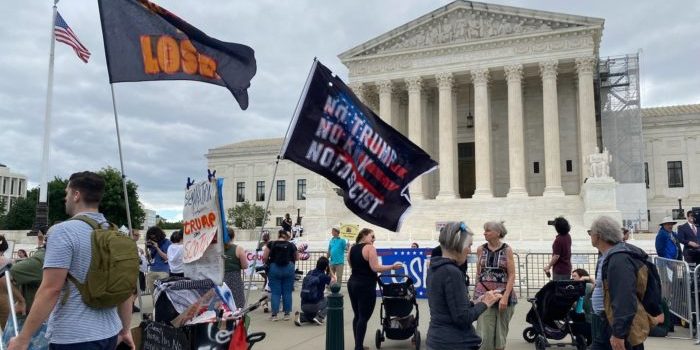Note: This story was originally published the morning of July 1 to preview the Supreme Court’s impending presidential-immunity decision. SCOTUS released the decision shortly after the publication of this article. Headline USA has adjusted the headline and added details at the top of the story to reflect the decision. The rest of the article remains unchanged.
(Ben Sellers, Headline USA) In another win for presidential front runner Donald Trump, the U.S. Supreme Court ruled Monday that sitting presidents have “presumptive immunity” from prosecution.
“The President is not above the law. But under our system of separate powers, the President may not be prosecuted for exercising his core constitutional powers, and he is entitled to at least presumptive immunity from prosecution for his official acts,” Chief Justice John Roberts wrote in for the 6-3 conservative majority. “That immunity applies equally to all occupants of the Oval Office.”
The case will now go back to the lower courts.
In sum: pic.twitter.com/IoORBLjIAe
— Julie Kelly 🇺🇸 (@julie_kelly2) July 1, 2024
Monday’s development was one of the last remaining decisions for the U.S. Supreme Court to release before a summer break. SCOTUS was deciding whether President Donald Trump and other presidents should be granted legal immunity from civil or criminal prosecution based on alleged offenses they committed while acting in the interest of the nation.
When the court first heard the case in April, several of the justices seemed to look more favorably than expected on the arguments as to why it was necessary for the chief executive to be able to act without fear of subsequent political attacks as Trump has faced repeatedly in his post-presidency, the result in large part of his decision to run again in the 2024 election.
“Without presidential immunity from criminal prosecution, there can be no presidency as we know it,” Trump attorney John Sauer told the justices.
HAPPENING NOW: RSBN coverage of arguments on President Trump’s immunity case before the U.S. Supreme Court begins NOW, with opening statement from Trump attorney John Sauer pic.twitter.com/0AxcUWycx7
— RSBN 🇺🇸 (@RSBNetwork) April 25, 2024
“For 234 years of American history, no president was ever prosecuted for his official acts,” he continued. “If a president can be charged, put on trial and imprisoned for his most controversial decisions as soon as he leaves office, that looming threat will distort the president’s decision-making precisely when bold and fearless action is most needed.”
Sauer and his legal team pointed to specific examples from the recent presidencies of George W. Bush, Barack Obama and Joe Biden to underscore the fact that all, by the standard Trump had been held to, would have been subject to prosecution for controversial policies that, for all intents and purposes, violated the laws that ordinary civilians would have been subjected to.
Nonetheless, there is a strong possibility that the court, reluctant to get involved in matters that will directly impact the upcoming presidential election, will render a mixed verdict, perhaps offering some sort of limited or qualified immunity but ultimately sending Trump’s specific case back to the lower courts for further consideration.
The immunity decision could potentially impact both of his federal cases being brought by special counsel Jack Smith, although the defense seems most focused on the case in the D.C. courts being overseen by far-left judge Tanya Chutkan.
Chutkan would likely attempt to move with all deliberate speed to fast-track the hearings on the matter, but it is unlikely that the case would be heard prior to the November election, when a Trump victory could render it moot.
If Trump were re-elected president, he would likely appoint an attorney general who would drop the federal proceedings and fire the deeply partisan Smith—who, some have argued, was illegitimately appointed in the first place.
The court’s decision on Monday is likely to draw major protests as a result. Leftists have been pushing a barrage of smear campaigns in an effort to force conservative justices to recuse themselves, if not resign altogether.
A Trump exoneration would almost certainly mobilize activists to ramp up those attacks as part of a political push to justify packing the court with leftist judges.
Headline USA intends to provide on-the-scene updates via Twitter should any demonstrations or other newsworthy events break out in front of the court in the aftermath of the announcement.
The immunity decision was one of several high-impact rulings to drop in the court’s latest round. Others included Friday’s decision rejecting “obstruction” charges against Jan. 6 defendants after plaintiffs argued that the law used—written in response to Enron’s financial scandal during the Bush 43 administration— was never intended to apply to criminal proceedings.
The court also ruled that plaintiffs in a case about government-induced social-media censorship regarding the pandemic and several other significant issues lacked the standing to proceed on the basis they could not prove any ongoing harm or injury.
That case is likely to have a chilling effect on free speech via online platforms moving forward, emboldening agencies like the FBI to pressure left-wing tech companies to promote propagandist narratives and disinformation in the interest of their political imperatives.
In both of those and other cases, Justice Amy Coney Barrett—one of the three Trump appointees, who sparked leftist outrage when she replaced liberal icon Ruth Bader Ginbsberg on the court—sided with the court’s liberals, raising questions as to whether she should be considered a “conservative” justice.
In addition to the immunity decision, the court is expected to release three others, including another major case over social-media laws in Texas and Florida that could limit how platforms regulate content posted, according to the Associated Press.
Both states’ laws aimed to address conservative complaints that left-leaning companies censored users based on their viewpoints, especially on the political Right.
Ben Sellers is the editor of Headline USA. Follow him at twitter.com/realbensellers.
Headline USA’s Ken Silva contributed to this report.

